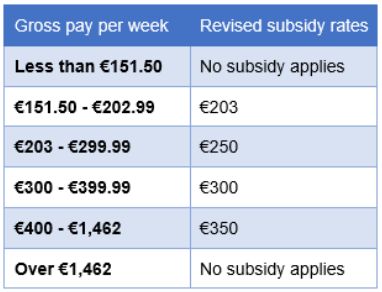As elsewhere, Irish workplaces witnessed unprecedented disruption in 2020 with the onset of the COVID-19 pandemic. Since that time, Irish society has faced some of the most stringent restrictions in Europe. Now, with the reopening of many workplaces and businesses tentatively scheduled for the summer months, we take a look at the current state-of-play, outlining both the key challenges facing employers over the coming months and the longer-term workplace trends, accelerated by the pandemic, that may be here to stay.
Richard Lee and JJ McLoughlin are members of BHSM LLP's Employment & Benefits practice, advising domestic and international corporate clients in contentious and non-contentious issues that arise in all aspects of the employer and employee relationship.
Are there any state-aid programmes for employers in Ireland?
The Government of Ireland (the Government) has introduced a number of support schemes for employers in Ireland in light of COVID-19.
Currently, qualifying employers can avail of the Employment Wage Subsidy Scheme (EWSS), which will run until 30 June 2021.
Under the EWSS, employers whose turnover has fallen by 30% or more can apply for a flat-rate wage subsidy for their employees, based on the number of qualifying employees on the payroll. Qualifying employees can include seasonal staff and new employees. In circumstances where an employee has more than one place of employment, each employer can apply for the EWSS irrespective of that employee's other jobs.
The subsidy amount provided to employers will depend on the gross income of each employee. The current subsidy rates are:

What are the rules or regulations for medical leave of absence due to COVID-19? Are employees entitled to any financial support from an employer or the state during such sickness leave and if so, for how long? Does the same apply to quarantine / isolation?
Public health advice directs that employees showing symptoms of COVID-19 should not go to work and should instead contact their local doctor and / or isolate. There is no statutory obligation on employers to provide sick pay to employees who cannot work due to COVID-19, so any entitlement to sick pay will be determined by the contract of employment in place.
Employees who do not have a contractual entitlement to sick pay can apply for COVID-19 enhanced Illness Benefit from the Department of Social Protection.
Employees with caring responsibilities who are unable to attend work because they must care for a sick child or other relative are entitled to ask an employer for paid leave. Where an employer is unable to provide paid leave, employees can request statutory leave. Categories of statutory leave that an employee may avail of in qualifying circumstances include force majeure leave, parental leave, and parent's leave.
The Government, the Workplace Relations Commission and the Health Safety Authority have all asked that, to the extent practical, employers show flexibility with regard to employees' working arrangement requests due to the COVID-19 pandemic. Examples include offering employees paid compassionate leave, altering shifts to allow employees to coordinate caring responsibilities, allowing employees to rearrange holidays , allowing employees to work remotely, and allowing employees to take paid time o that can be worked back at a later date.
What are the rules or regulations surrounding remote working during the pandemic in Ireland and how do you foresee this developing over the rest of this year? Is home-office ordered by state authorities or rather "just" recommended?
The Government's Living with COVID19 Plan (the Plan) sets out 5 levels of restrictions that correspond to the severity of COVID-19 in a location. Under Levels 3, 4 and 5 of the Plan, employees are advised to work from home unless it is essential to go to work in person. Ireland is currently at Level 5 restrictions.
In January 2021, the Government published its National Remote Work Strategy (the Strategy). While the Strategy does not have legislative force, its publication is a large step towards making remote working a permanent option in Ireland. The Strategy outlines key actions to be taken by the Government to promote and facilitate remote working in Ireland, which include:
- introducing legislation to provide employees the right to request remote working (expected in Q3 of 2021);
- introducing a legally admissible Code of Practice on the right to disconnect from work ( since published 1 April 2021);
- investing in remote work hubs across Ireland;
- accelerating the delivery of high-speed broadband throughout Ireland;
- reviewing the tax treatment of remote working in the Budget 2022; and
- mandating that home and remote working should be the norm for 20% of public sector employees.
Code of Practice on the Right to Disconnect
Following the publication of the Strategy, new legally admissible Code of Practice on the Right to Disconnect (the Code) came into effect on 1 April 2021. The Code gives employees the right to switch o from work outside of normal working hours, including the right to not respond immediately to emails, telephone calls or other messages. The Code applies to all types of employment, whether employees are working remotely or not.
Enshrined in the Code is:
- the right of an employee to not routinely perform work outside their normal working hours;
- the right not to be penalised for refusing to attend to work matters outside of normal working hours; and
- the duty for both employers and employees to respect another person's right to disconnect (e.g. by not routinely emailing or calling outside normal working hours).
Employers are encouraged to engage proactively with employees and/or their representatives to develop a Right to Disconnect Policy that takes account of the particular needs of the workplace and its workforce.
Is it possible for employers in Ireland to order employees to participate in COVID-19 quick tests and / or vaccination?
It is essential to note that an employee cannot be forced by his / her employer to take a COVID-19 test and / or vaccination. Any steps taken to do so would come with considerable legal risk to the employer.
The Irish Constitution enshrines specific rights including the right to autonomy, bodily integrity, and privacy. The Irish State also has a general duty to protect individuals' right to work and earn a livelihood from unjust attack. There may also be reasons why an employee would refuse to take a COVID-19 test and / or vaccine such as medical or religious grounds (which would attract the protection of employment equality legislation).
Whilst an employee has various rights protected by the Constitution, most notably a right to bodily integrity in this context, an employer will also need to give consideration to its duty to ensure the safety, health, and welfare at work of other staff members under section 8 of the Safety, Health and Welfare at Work Act 2005.
In implementing policies and procedures to uphold this duty, an employer should review existing policies and procedures / COVID-19 plans and carry out a risk assessment to analyse if there is a business need to have employees in close proximity and vaccinated, or if alternative measures should be adopted such as remote working or redeployment of employees. Alternatively, any protocol drawn up in relation to workplace vaccinations should be communicated to employees who should be encouraged to be vaccinated in order to protect the health & safety of the general workforce.
However, the underlying principle remains that an employer cannot order employees to participate in COVID-19 quick tests and / or vaccination without risk of potential employment law claims or raising serious constitutional issues.
Is an employer obliged to provide protective equipment to employees such as face-masks or other measures?
On 30 November 2020 , the Government published the COVID-19 National Protocol for Employers and Workers (the Protocol). The Protocol outlines steps that employers and employees should take before a closed workplace reopens to ensure that they can return to work safely and sets out minimum standards needed in every workplace to manage and prevent the spread of infection.
Measures, systems and controls that an employer must put in place include:
- Appointing at least one lead employee representative to assist in the implementation and monitoring of safety measures;
- Developing and / or updating the workplace's COVID-19 Response Plan, the occupational health and safety risk assessment, and the safety statement;
- Providing COVID-19 induction training for all staff;
Putting in place temperature testing in line with public health advice; - Putting in place any mass COVID-19 testing needed in line with public health advice;
- Putting in place appropriate hygiene facilities;
- Providing for physical distancing across all work activities of at least 2 metres to the extent possible;
- Installing physical barriers in circumstances where 2 metre distancing is not possible;
- Keeping a log of contacts to help with contact tracing;
- Arranging for regular cleaning of the workplace; and
- Providing Personal Protective Equipment (PPE) and protective clothing where there is an identified COVID-19 exposure risk and in line with public health advice.
Inspections of workplaces can be carried out by both the Health Safety Authority and the Workplace Relations Commission.
Originally Published by TRENDS – Employment Law – May/June 2021.
The content of this article is intended to provide a general guide to the subject matter. Specialist advice should be sought about your specific circumstances.


